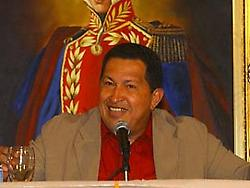Untitled Document
 |
Venezuela's President Chavez
as he addressed the country on all channels. Credit: RNV |
Venezuelan President Hugo Chávez Frías, in a televised
address last night, accused the United States of being behind several opposition
parties’ pullout from this Sunday’s National Assembly election and
called on the Venezuelan people to turn out to vote.
“Another conspiracy is being acted out against Venezuela, and
I am not going to blame the dogs but the masters, the government of the United
States,” said Chávez.
The announcements of the election boycott came Tuesday and Wednesday of this
week, with party leaders citing concerns about voter fraud and ballot secrecy
as their reasons for withdrawal. Two days earlier, according to an Organization
of American States press release, three of the four opposition parties leading
the boycott had committed to participate in the elections after the Venezuelan
electoral council had conceded to many of the parties’ demands.
“The Mission was present today at the meeting at which the CNE [the Venezuelan
electoral council]…where [opposition] parties committed themselves to
participating in the elections and encouraging citizens to vote, noting that
‘the secrecy of the vote in this process will not be violated,’”
said the statement, which was released before the opposition parties decision
to boycott was announced.
Among other concessions, the CNE had agreed to remove fingerprint scanners to
protect voter anonymity and to open 45% of the country’s ballot boxes
to guard against voter fraud.
In yesterday’s televised address, which was broadcast on all channels,
Chávez went on to say the CIA was plotting against his government. “I
even have proof of how the Central Intelligence Agency of the United States
is now moving in Venezuela, the Caribbean, and other Latin American countries,
encouraging this new conspiracy, which might include assassination,” he
said, but did not make this evidence public.
The CIA, according to documents obtained under the Freedom of Information Act,
had had learned that there was to be a coup attempt against the South American
President in 2002, but had not informed Venezuelan authorities. Despite this
knowledge, during the April coup, US officials initially blamed Chávez
for provoking the crisis.
Chávez’s televised comments echoed those of Vice-President Jose
Vincent Rangel who, earlier this week, said that the US Embassy had been actively
involved in the “electoral strike.” Like Chávez, he did not
provide evidence for his assertion. However, the International Republican Institute,
which receives Congressional Funding through the National Endowment for Democracy,
says that it has been actively training opposition party members, including
those belonging to the four main groups involved in the election boycott.
Yesterday, the US State Department Spokesman Sean McCormack softened earlier
comments about the legitimacy of the election. He had previously denied US involvement
but commented that the State Department was concerned that the right to free
and fair elections in Venezuela “is increasingly in jeopardy.” When
asked the next day to clarify whether this meant the US had evidence about the
election that the OAS did not, or if the State Department had lost confidence
in international observes, McCormack responded, “That particular part
of my response yesterday referred to our longstanding concerns about democracy
in Venezuela and the way in which the current government has governed. Let’s
just move on.”
Chávez also called for high voter turnout. Saying that there would be
attempts to sabotage democracy in Venezuela until the presidential elections
next December, he declared, “Every time they hit us, like they’re
doing with this new electoral ambush, the Bolivarian government and the people
will respond with a counterpunch.”
In addition to voting, the president encouraged people to permanently mobilize
to fight North American imperialism. “Let’s all move, all deploy
ourselves, like we did on the 12 and 13 of April…We want to be left in
peace, but if any violent incident should be launched, it will find us here,
firm like soldiers, ready to defend…our national independence,”
he said.
The opposition withdrawal means that Movimiento Quinta Republica, Chávez’s
party, which currently controls 52 percent of the National Assembly, will almost
certainly win the two-thirds majority necessary to make constitutional changes.
Polls indicated that this was the likely result, even before the opposition
pull out.
As of yet, it is still unclear how widespread the election boycott will be.
A CNE announcement from 1pm on Thursday, said that 72 of the 4,053 total candidates
had withdrawn themselves from the race. The vast majority of the total candidates
belong to minor parties, but only 5 out of the 41 members of the four main boycotting
parties who currently hold seats in the National Assembly have withdrawn themselves
from the race. Acción Democrática, one of the boycotting groups,
said that it will sanction candidates who decide to run. Opposition members
have until Saturday at midnight to renounce their candidacy.

